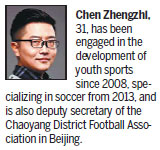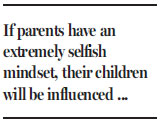Parents must care more about enjoyment, not rewards
Updated: 2016-10-14 07:59
(China Daily)
|
|||||||||
There is no doubt that the recently released policies have led to a rise in the number of people participating in soccer, in terms of both amateur players and related businesses. Older players in the field are also discovering new ways to break through. These factors have resulted in improved development of sports generally and may help the country's soccer players perform better at the professional level.

However, some parents are sending their kids to soccer schools with a far too utilitarian, or result-oriented, mindset that emphasizes how well the child performs and what they can gain. From my perspective, this contradicts the very nature of soccer, which is teamwork. After all, it is a team sport.
If parents have an extremely selfish mindset, their children will be influenced and there will be no point in talking about "the team". The kids would only care about their own improvement and gaining a place at a renowned school via their soccer skills.
Luckily we don't see many selfish kids on the turf, but some parents used to yell and scold them for making moves that didn't fit the coach's methods, or for zoning out. We perfectly understand why kids do these things and we have measures to guide them. Sadly, some parents didn't get it, and occasionally they even rushed onto the field to berate their kids. In the end, we had to move the parents further away from the pitch.

I have talked to many parents, possibly as many as 2,000. In terms of the reasons they send their children to soccer schools, there are generally three types of parents: those who simply follow the trend and fear that their kids will fall behind others or won't blend in; those who want their kids to win certificates that may benefit them in future school entrance exams; and those who value their child's interests.
I guess these three types are quite distinct from each other, but fortunately, many post-1980s parents are firmly in the third category.
Chen Zhengzhi spoke with China Daily.
(China Daily 10/14/2016 page6)
Today's Top News
Xi: China considers Bangladesh important partner
Britain's May, faced with turmoil, agrees to a debate
Deals with Cambodia include energy, trade
Trump accused of inappropriate touching by women
China expresses condolences over death of Thai King
Chinese president arrives in Cambodia for state visit
Thai King, world's longest-reigning monarch, dies
Q3 trade growth rebounds, pressure remains
Hot Topics
Lunar probe , China growth forecasts, Emission rules get tougher, China seen through 'colored lens', International board,
Editor's Picks

|

|

|

|

|

|







